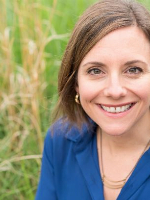
May 6-10, 2024 - Virtual via Zoom
Family support programs for infants and children with developmental delays and disabilities have traditionally focused on parents, and rightfully so. But what about siblings? Siblings play important roles as companions, advocates, and caregivers, and often share the longest relationship with the family member with a disability. Sibs experience similar issues as parents, and unique concerns of their own. Join us to hear from a diverse panel of adult siblings as they reflect on their experiences growing up and share insights on how professionals and parents can support siblings in ways that benefit the entire family.

Emily Holl is the Director of The Sibling Support Project, the first national program dedicated to supporting siblings of people with support needs. Emily is a sibling and social worker who has written about her experiences in blogs, magazines and books such as “Thicker than Water.” She was a co-editor of “The Sibling Survival Guide: Indispensable Information for Adult Brothers and Sisters of People with Disabilities.” Emily earned a B.A. from the University of Massachusetts, a MFA from Columbia University, and a MSW from Hunter College at the City University of New York.